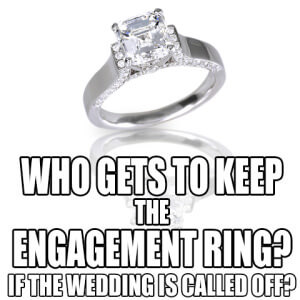 As a Divorce Lawyer on Long Island, one of the questions I hear when marriages are called off, or even result in divorce is, “Do I get to keep my engagement ring?” or “Can I get the engagement ring back?”
As a Divorce Lawyer on Long Island, one of the questions I hear when marriages are called off, or even result in divorce is, “Do I get to keep my engagement ring?” or “Can I get the engagement ring back?”
In most relationships, one partner spends a significant amount of money on an engagement ring on behalf of the other partner. A lot of “advice” on this topic suggests the proposer should spend two months’ salary on the engagement ring. Naturally, one would assume that the partner who purchased the ring was entitled to keep it or get it back if the engagement is called off, but that’s not always the case. Who gets to keep the ring is solely centered upon whether that ring was a straightforward gift from one partner to the other, or if the ring was solely a gift in contemplation of marriage. In any case, once the marriage occurs, the engagement ring is usually considered to be the property of the recipient, unless the couple comes to some other agreement.
What is a Gift in Nassau County or Suffolk County Courts?
When you think of the word “gift” your mind likely jumps to special days like birthdays, anniversaries, etc. or holidays like Christmas, Hanukkah, Valentine’s Day, etc. due to the giving and/or receiving of beautifully wrapped presents. However, clothes or jewelry do not require wrapping paper to be considered a gift. So long as the giver has the intent to give a gift, the same is delivered to the recipient, and the recipient accepts it, a gift has been made. Upon the satisfaction of the above three requirements, the gift becomes irrevocable.
So, Does the Recipient Always Get to Keep the Engagement Ring?
If the parties never marry, the answer in Suffolk County and Nassau County courts on Long Island is an emphatic “no”. Most states, including New York, require the recipient to return the engagement ring to the giver because the ring is classified as a conditional gift. The condition placed upon the gift, naturally, is the marriage of the parties. If the condition is not satisfied and the marriage is called off, the engagement ring must be returned to the giver, regardless of whose fault the broken engagement is.
The recent Nassau County case of Torres v. Lopez demonstrates this point
The Defendant testified as follows: Although there was no marriage proposal, the Plaintiff had given the Defendant a diamond ring in April of 2010, after at least six years of dating and referring to each other as “spouses”. The Plaintiff’s reasons for purchasing this ring were to show his appreciation to the Defendant for being a good mother. However, the Defendant contributed $4,500 of her own funds toward the purchase of such. Additionally, when asked by friends and family if the ring was an engagement ring, the Defendant always stated that she was not sure yet because the Plaintiff had never asked her to marry him. Sometime in October of 2011 the Plaintiff and Defendant parted ways, and the Defendant eventually moved out of the parties’ shared apartment.
The Plaintiff’s testimony: The Plaintiff testified that the ring was an engagement ring, and therefore he was entitled to its return. According to the Plaintiff, the Defendant did not contribute funds to its purchase price, the two referred to each other as “fiancée”, the Defendant’s family had already begun planning an engagement party for the couple, and the couple had looked at wedding venues. However, upon the relationship’s demise, the Defendant refused to give the Plaintiff the ring back.
Weighing the testimony of both parties against the other, the Court found the Defendant’s testimony to be more credible. While the factual issues presented were close, the Plaintiff had the burden to establish by a preponderance of the evidence that the ring was given to the Defendant in contemplation of marriage. Because he called no other witnesses, submitted no bank records, no receipts stating that the ring was an engagement ring, or anything else evidencing the fact this was not an unconditional gift, the Court held that Plaintiff was entitled to keep the ring.
What Does This Mean For Me?
Therefore, while it seems the outcome of these situations may be highly fact-specific, it is important to note that if it is not clear whether or not the ring was an “engagement ring” given upon the condition that the parties would marry, the recipient may be entitled to retain its possession. If you are thinking of a marriage proposal, you may even wish to ensure the invoice or receipt states that the ring is in fact an engagement ring. As always, it is important to discuss the specifics of your case with your Long Island Divorce Attorney.
Distribution of Property in Divorce Questions?
Compassionate Long Island Divorce Attorney Has Answers
The experienced and compassionate divorce attorneys at Robert E. Hornberger, Esq. P.C. have helped hundreds of Long Island couples resolved their divorce and legal separation issues amicably and affordably. Contact us today at 631-923-1910 to schedule your free, no-obligation consultation with an experienced Long Island divorce attorney.












